















|
Pattaya Festival kicks off in grand style
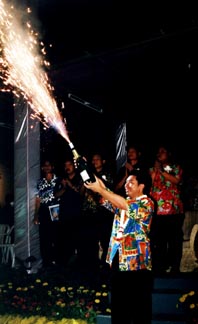 After 20 consecutive years, Pattaya City’s annual festival bids adieu with a
spectacular display of lights in the bay viewed by 10,000 visiting tourists After 20 consecutive years, Pattaya City’s annual festival bids adieu with a
spectacular display of lights in the bay viewed by 10,000 visiting tourists
After 20 years of celebrating Pattaya City’s annual festival during Songkran week, plans are afoot to move it to another date. So, city administrators gave
this time slot a grand sendoff, beginning with a fantastic festival party and grand parade on April 12.
The annual festival has evolved into a cultural representation of the varied traditions from all over Thailand. The event does a lot to preserve the regional
customs of the many varied people who have descended upon Pattaya to earn a living. Through the festival, Pattaya has helped these culturally diverse people present their
heritage to foreign tourists and travelers in Thailand.
 Sonthaya Khunpluem, Minister of Science, Technology and Environment, officially
opened the 20th Pattaya City Festival during a ceremony at the stage opposite Soi 4 on Pattaya Beach Road. Sonthaya Khunpluem, Minister of Science, Technology and Environment, officially
opened the 20th Pattaya City Festival during a ceremony at the stage opposite Soi 4 on Pattaya Beach Road.
Wannapa Wannasri of the Pattaya City Education department narrated in Thai whilst Pattaya Mail’s Pratheep Malhotra provided commentary in English, for the
large crowd of visitors.
 The parade down Beach Road, which began at 5.20 p.m., enjoyed the participation of
thousands of people marching, singing, dancing and generally having fun, as only Thai people can. The parade down Beach Road, which began at 5.20 p.m., enjoyed the participation of
thousands of people marching, singing, dancing and generally having fun, as only Thai people can.
Parade entries included floats, marching bands and cultural dances performed by young and old. As an added incentive, entries competed for 100,000 baht in
prizes and trophies in the name of Her Royal Highness Princess Maha Chakri Sirindhorn. Associate judges from the provincial court, Mrs. Panga Vathanakul and Mrs. Sopin
Thappajug judged the entries.
 For the second consecutive year, Nong Nooch Tropical Gardens earned the title of
“Best Float” with their beautiful portrayal of the country persevering and prospering under H.M. King Bhumibol Adulyadej’s proclamation calling for economic
self-sufficiency. For the second consecutive year, Nong Nooch Tropical Gardens earned the title of
“Best Float” with their beautiful portrayal of the country persevering and prospering under H.M. King Bhumibol Adulyadej’s proclamation calling for economic
self-sufficiency.
The Royal Cliff Beach Resort, with their float titled “Ratanakosin 2001”, won second place, while third place went to the float from Mike’s Shopping
Mall named “Supanahongse Maha Songkran”.
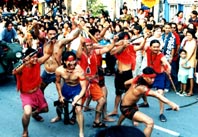 Following the parade, the opening day ceremony continued with “champagne
fireworks” and a spectacular display of colorful lights and water fountains pictured across the bay. Following the parade, the opening day ceremony continued with “champagne
fireworks” and a spectacular display of colorful lights and water fountains pictured across the bay.
The city hired the Street Light Company to organize the opening day festivities, and invested over 600,000 baht for hi-tech special effects.
 The S.Y. Seniorita Company was hired to take charge of the activities for the rest of
the week, presenting nightly entertainment featuring popular Thai singers and bands, comedians, troupes of dancers and cultural exhibitions portraying customs from all regions
of Thailand. Other entertainment included talented mimes, beauty contests and other on-stage performances, boxing, water sports competitions and loads of local and regional
merchandise displayed along Beach Road. The S.Y. Seniorita Company was hired to take charge of the activities for the rest of
the week, presenting nightly entertainment featuring popular Thai singers and bands, comedians, troupes of dancers and cultural exhibitions portraying customs from all regions
of Thailand. Other entertainment included talented mimes, beauty contests and other on-stage performances, boxing, water sports competitions and loads of local and regional
merchandise displayed along Beach Road.
Pattaya’s “Wan Lai” activity, the day scheduled for water play, was on the last day of the festival, April 19, and took place following a ceremony at
Wat Chaiyamongkol. Each road and every street and alley in the Pattaya area joined in the wild, wet fun, celebrating the Songkran Festival.
Naklua held their “Wan Lai” celebration on the 18th with a morning water pouring ceremony at Wat Pho.
Wat Yan continues its beautiful expansion
Story by Phirapong Chiranai
Photos by Damree Muangkaew
Wat Yan is the local name for a beautiful Buddhist Temple called Wat Yansangwararam waramahawiharn. The Buddhist temple, renowned for its “largest Buddha
image in the world”, carved in gold on the face on the cliff of Chichan Mountain, is continuing its expansion, truly becoming one of the most beautiful vestiges to the
Buddhist faith in the world.
 A beautiful remembrance of the
Princess Mother A beautiful remembrance of the
Princess Mother
Major construction began in 1976 with royal funding, and was dedicated to the current foremost Buddhist Monk in Thailand, the Supreme Patriarch Somdej
Phra Yansangworn Somdej Phrasangkharach Sakolmahasangporinayok.
The surrounding landscape at Wat Yan is being created into a “Superior Temple with a Royal Pleasure Garden”.
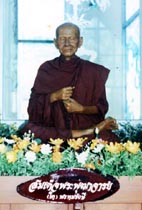 Wax figure of Somdej Phraputha
Ahchan (To) Promrangsi Wax figure of Somdej Phraputha
Ahchan (To) Promrangsi
Miniature replicas of shrines from around the world have been created, set amidst a variety of tropical trees with in-laid brick walkways, small gardens
and fountains surrounded by well-manicured grass lawns.
The temple has enjoyed royal patronage and was favored by His Majesty King Prajadhipok (Rama VII), as well as the parents of His Majesty King Bhumibol
Adulyadej the Great.
Construction was completed near the end of 1999, with palm trees lining the entranceway leading into the temple grounds. Monuments of Rama VII and the
Princess Mother with her husband have been erected so they may gaze upon some of the most spectacular views at the temple.
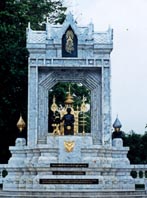 Statue of Rama VII in a
miniature shrine at Wat Yan Statue of Rama VII in a
miniature shrine at Wat Yan
The latest addition to the temple is a building with a large hall housing images of 20 renowned monks from around Thailand. The figures, made out of wax,
portray incredible likenesses of the highly revered monks.
Located on 366 rai of land in Huay Yai and Sattahip Sub-districts, just 15 kilometers south of Pattaya, Wat Yan is conveniently located off Sukhumvit Road
south out of Pattaya. Just turn left at kilometer marker 160 and proceed for about five kilometers to the entrance of the temple grounds.
Royal India opens with fanfare of trumpets
All of Pattaya’s leading Indian groups were represented at the Grand Opening of the Royal India Restaurant. Located on Second Road in front of the Grand
Sole Hotel, the owners, Amrik Singh Kalra and his son Jay, welcomed everyone as they received congratulatory gifts and bouquets, with the guests staying on for a buffet
evening meal.
 Lovers of Indian food praised the
opening of the Royal Indian Restaurant last week. Lovers of Indian food praised the
opening of the Royal Indian Restaurant last week.
The guests and well-wishers were not restricted to the Indian community however, with many nationalities, all lovers of Indian and Mughlai cuisine,
Tandoori’s and curries flowing out onto the outside area of the restaurant to mix together around the tables, united by the universal love of the Indian food.
The Royal India Restaurant was reviewed last week in the Dining Out section of the Pattaya Mail and received a Highly Recommended rating. The guests at the
grand opening all agreed with the review and the future of Royal India seems assured.
“Pim” crowned Miss Tiffany’s Universe 2001
by Veerachai Somchart
Mr. Peeyada Sakulthai, also known as Ms Kan (Pim) Rungchao, a 25 year old girl of the second category and student at the Bangna Commercial College in
Bangkok, was crowned “Miss Tiffany’s Universe 2001". The title earned him/her 100,000 baht and a trip to America to represent Thailand in the upcoming “Queen of
the Universe 2001” contest.
 A queen amongst men - Peeyada
Sakulthai, also known as Kan Rungchao, and his court. Photo by Chakrapong Akkaranant A queen amongst men - Peeyada
Sakulthai, also known as Kan Rungchao, and his court. Photo by Chakrapong Akkaranant
Pim won the title before a packed house at 1 a.m. on April 1 (no joke) after being selected from a gaggle of 51 Miss Tiffany’s Universe wannabes.
Election and anti-corruption commissioner Yurarat Kamolvej presided over the opening ceremony, along with Tiffany’s board of directors chairman Sutham
Phantusak. Renowned academic Doctor Seri Wongmonta chaired the panel of judges, which included prominent people from show business, modeling and journalism.
Pattaya Mail’s Teetha Clench, long since departed for greener pastures, would have truly enjoyed the show, as contestants were judged on their cocktail
dresses and cr่me colored evening gowns.
Highlights of the evening included the popular Tina Turner act and another stage performance simulating an act from Brazil.
Awards on the night included Kaewlin Samredsuk (#33) winning “Miss Congeniality”, Nadia Phuhachat (#28) earning Best Outfit, and Phornphanit
Sitthiyotha (#29) winning Miss Photogenic and the coveted World Gems Collections selection.
Tiffany’s Queen from last year, who also won the Miss Queen of the Universe 2000 pageant, Chanya Moranon began the finale by inducing the 30 finalists to
perform the all appropriate number “Dancing Queen”.
Whittling the selection down to 10 finalists was difficult, and another round was necessary before excruciatingly difficult questions, such as what their
names were and where they were from, were used to determine the final three beauties based on their wit, brain and charm.
Second place was awarded to Pathomporn Thanaphat (#5) and third place went to Miss Photogenic and World Gems Collections selection Phornphanit Sitthiyotha
(#29).
The grand winner, Peeyada Sakulthai lived in Switzerland for a time learning to speak both French and English, and recently completed studies at Bangna
Commercial College. Peeyada underwent surgery five-years ago to change his sexual identity.
Winning the Miss Tiffany’s Universe 2001 crown is the greatest accomplishment in her life and fulfills a life-long dream, “almost as wonderful as my
other dream of being a genuine woman,” said Pim.
Hash Social Saturday
7th April - A Day at the beach
by CF
Sign up at the Scandi Bar 1300 hrs for a 1330 bus departure to the beach some 18 km south of Pattaya. I arrived ahead of the beer truck where Spaghetti
Head was waiting to guide me in reverse down the near vertical entrance to the beach (I spent the rest of the day wondering if myself and Rottweiler would be spending a
romantic night on the beach if I couldn’t get back up the hill).
 Enjoying life during a “Day on
the Beach” Enjoying life during a “Day on
the Beach”
Flying Frog with his girls had the food stall set up and ready to fire up the BBQ. The beer truck arrived next with the eagerly awaited cold refreshments
for those of us who had made our own way out to the beach. But where was the bus? Surely our Grand Master Boy George hadn’t got the bus lost?
Then hashers started appearing, walking down the beach from the Pattaya direction; apparently Boy George had missed the HHH sign at the top of the intended
soi so they drove down the next soi, but this kind of thing does not bother the Pattaya Hasher when they are out to enjoy themselves.
Karamba and Fossil appeared with their black canine friends who immediately took to the water and then decided to spray everybody with water and sand. Boy
George soon got the dogs under control by taking them into the water for a little cuddle or two. I am not certain who enjoyed this most, George or the dogs.
Anyway, enough about Boy George’s fetish. The weather was beautiful, the only problem being the shortage of shade. The umbrellas we had were a great help
but there weren’t enough of them so the village people decided to do a round trip to Lotus to purchase some extra umbrellas. But considering the time they took I’m sure
they got diverted whilst in the vicinity of the rifle range!
Sir Airhead appeared a good hour or so after the bus and speedily recruited the ladies to blow up his own personal yellow rubber doll floating support,
though in time too much weight took it’s toll on the floater and it eventually went down on him! (Isn’t this the deluxe model?).
Most people, now full of the amber nectar, took to the water and there were quite some amazing sights, the girls in their bikinis and the men in whatever
they were wearing at the time. Fossil was proving that the Theory of Relativity was really true, Ewok proving for once and for all that the earth is not flat.
I was a founder member of “The Flat Earth Society” - it costs 10 dollars to join and you got your money back if you fell off the end of the earth!
Anyway, I thought the girls all looked great. Boy George didn’t take much notice, though, as he was training his canine friends.
A Breadfruit did a good job of fetching the beer if you needed one. It was a great relief when the sun started to go down, myself and Seagull S could
finally come out from under the towels.
I decided to join Streaker, Airhead and the village people who were chewing the fat in the water, but I floated out past them against the tide and was
renamed Moby C for the day.
The food stall was kept busy because of the excellent BBQ provided by Flying Frog and his staff. Chicken Fellow had made sure there was plenty of liquid
refreshment available, so all in all it turned out to be an excellent day out for the 60 or so hashers who had turned up for this first social event. Lets have many more I
say!
Ten of the best reasons to enjoy a glass of wine
by Ranjith Chandrasiri
The Thai government has again increased the excise tax on wine. Wine branded as a non-essential beverage and a health hazard, was especially targeted. I
would like to request decision makers in the government to gets their facts correct and following are some findings.
The next time you raise a glass of wine to toast a friend’s health, you may be doing more than expressing goodwill. A great number of studies have been
done to determine the therapeutic and disease-fighting powers of wine, both red and white. While some of the studies cited below are more conclusive than others, each of them
offers a good reason to make wine part of daily life. Here are 10 of the most compelling findings.
1. Wine may prolong your life. In 1997 Michael Thun, M.D., and his colleagues at the American Cancer Society found that one or two drinks a day over a
nine-year period reduced a person’s risk of death by 20 percent. Moreover, in a French study published in 1998 involving more than 34,000 middle-aged men, the group that
consumed a generous two to five glasses of wine a day had a 24 to 31 percent reduction in the overall death rate during the 10 and 15 year follow-up periods.
2. Wine decreases your risk of heart disease. In the past decade, more than a dozen studies have indicated that the consumption of up to one glass of wine
or beer or one mixed drink a day for women and up to two a day for men may reduce the risk of heart disease by as much as 50 percent. Researchers found that this level of
wine consumption raises HDL cholesterol (the good kind, which prevents fatty deposits from building up in artery walls) and inhibits the formation of blood clots. It also
enhances the factors that help break up blood clots when they form, according to Mary Ann Malloy, M.D., a cardiologist at Loyola University and spokesperson for the American
Heart Association.
3. Wine can improve your blood-cholesterol level. A 1998 Finnish study of 300 middle-aged men suggests that social drinking (defined here as one to four
glasses of wine a week) may also reduce blood concentrations of Lp(a) lipoprotein. This protein appears to play a role similar to that of harmful LDL cholesterol, leading to
the deposit of fat in blood vessels.
4. Wine may reduce your risk of arterial disease in the legs. In a 1997 study researchers discovered that men who drink one or two alcoholic beverages a
day have a 32 percent lower risk of peripheral arterial disease (PAD), or hardening of the arteries in the legs.
5. Wine might decrease your risk of blindness. In a 1998 study of more than 3,000 adults 45 to 74 years old, researchers found that those who consume
moderate amounts of wine have a significantly lower risk of developing macular degeneration, the leading cause of blindness among men and women over 65. Reasons may include
wine’s antioxidants (substances that prevent free radicals from causing cellular damage), tannins (astringent compounds) and flavonoids (substances in plants that have
anti-inflammatory properties and other benefits).
6. Wine may lower your chances of getting kidney stones. According to a 1998 report women who drink a glass of wine a day boast a 59 percent reduction in
the risk of getting their first kidney stone. (Researchers there found similar benefits for men.)
7. Wine could improve your psychological outlook. Any oenophile can attest to the relaxing powers of a glass of fine wine. According to a study published
in the September 1998 issue of The Lancet, adults (surveyed at ages 23 and 33) who drink moderately demonstrate a lower risk of poor physical health and of psychological
distress than teetotallers or heavy drinkers.
8. Wine may prevent food poisoning. In a 1995 laboratory study, researchers found that red and white wine killed off colonies of such bacteria as E. coli,
salmonella and shigella. Their conclusion: red and white wine may protect against bacterial diarrhoea.
9. Wine may protect you against Alzheimer’s disease. In a 1997 study of more than 2,000 people 65 and over, researchers at the University of Bordeaux in
France found that subjects who consumed a glass or two of wine a day had a reduced risk of Alzheimer’s disease. The scientists attributed this finding to the beneficial
effects of the antioxidants found in wine.
10. Wine won’t make you fat. It has long been assumed that drinking alcohol - often referred to by nutritionists as empty calories - can make you gain
weight. Recent research, however, suggests that moderate amounts of wine won’t have that effect.
Ranjith Chandrasiri is the resident manager of Royal Cliff Grand, Royal Cliff Beach Resort, Pattaya, Thailand. E-mail: [email protected] or [email protected]
Antiques, Are They Genuine? : Marker’s and other marks
by Apichart Panyadee
Few copper, brass, or bronze objects, other than the mass-produced items of the 19th and 20th centuries are marked by their makers. Therefore, it is little
help to rely on maker’s marks alone, although the makers of some objects have been identified and recorded. Some late 18th century brass workers and a number of 17th and
18th century skillet and mortar makers are known.
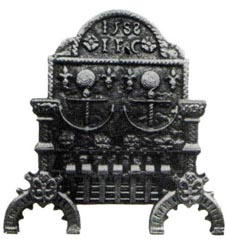 Hand made wrought iron candle
holder Hand made wrought iron candle
holder
As with pewter, some help may be offered by inscriptions, owner’s initials, and house marks. But care must be taken with inscriptions found on copper and
brass. Reproduction makers made their products more interesting by adding inscriptions and false owner’s names to many objects. A good example of this are the many tobacco
and snuff boxes with dated inscriptions to be found - all modern. You must look at the nature of the lettering and try to compare it with genuine inscriptions on objects
found in museums. Modern letters appear thin and scratchy and often far too sharp.
The condition of old metal ware
Take an object and run your fingers over all its surfaces. Is it smooth where it would naturally have worn? Are there clear signs of wear and are they
where they ought to logically be? Your fingers can often tell you more than your eyes. Where there are repairs, try and work out how the damage took place. Is it plausible?
By and large, people prefer their copper and brass polished, so some evidence of age, offered by the patina which is so helpful in identifying genuinely
old articles of pewter, is not always available for copper and brass. Some late 17th century and early 18th century brass and copper pieces of high quality were originally
silvered. It is wise to check al the crannies of a piece for evidence of this as it confirms an early manufacture, even though it means that the object is now not as it was
originally made. Later brass and copper items were sometimes silver plated and still later, they were electroplated. Again, it is worthwhile looking for evidence of this type
of treatment.
Iron and steel
Until the 19th century steel was hard to make. Its use was limited to cutting tools, weapons, and some jewellery. Gradually, improved manufacturing
techniques led to the more efficient combination of carbon with iron. From the Victorian period and onwards, steel was easily made and extensively used. It quickly drove out
wrought iron as the principal iron metal. Iron has been used in both its cast and wrought forms from the earliest times, but until the late 18th century iron for casting
tended to be brittle because of an excess of carbon and other impurities in the alloy. Although cast iron objects were made, their purpose was limited. Museums display a few
French cast iron mortars, and in the 17th and 18th centuries fine decorated firebacks were cast in the Sussex and Kentish Weald.
 Cast iron fire back from 1920’s Cast iron fire back from 1920’s
The invention by Abraham Darby early in the 18th century of blast furnaces able to use coke rather than charcoal lead to a rapid improvement in the quality
of iron. Production expanded dramatically. Cast iron was widely used in industry and construction and many domestic tools and objects were cast in ironworks that developed in
British coalfields. Until the mid-18th century it is true that most ironworks were local, small in scale and in the hands of blacksmiths. The ability to use coke for smelting
opened the door to large scale factory production.
Until the industrial revolution, the most widespread use of iron was in its wrought form. Every town had its blacksmiths, who, by heating, hammering,
re-heating, and shaping, made a range of useful domestic items and tools. Candle holders, grease pans, cutting tools, ladles, forks, jacks and chimney cranes are amongst the
objects most frequently found in wrought iron. Large quantities of gates, fences and decorative ironwork were also created.
Excellent fakes of lighting devices have been made in Spain in recent years, and even better copies are now coming from Asia. These include copies of
designs illustrated in standard reference works. The reproduction industry did not focus attention on wrought iron as it did on pewter, brass and copper. But individual
copies were made by blacksmiths everywhere throughout the 19th century, and even right up to the 1940s. It was possible to buy cast firebacks in the 1920s and 30s. These were
made in the same manner as the originals with similar ore and the same skills. These are difficult to detect.
Copyright 2001 Pattaya Mail Publishing Co.Ltd.
370/7-8 Pattaya Second Road, Pattaya City, Chonburi 20260, Thailand
Tel.66-38 411 240-1, 413 240-1, Fax:66-38 427 596; e-mail: [email protected]
|
|
 After 20 consecutive years, Pattaya City’s annual festival bids adieu with a
spectacular display of lights in the bay viewed by 10,000 visiting tourists
After 20 consecutive years, Pattaya City’s annual festival bids adieu with a
spectacular display of lights in the bay viewed by 10,000 visiting tourists Sonthaya Khunpluem, Minister of Science, Technology and Environment, officially
opened the 20th Pattaya City Festival during a ceremony at the stage opposite Soi 4 on Pattaya Beach Road.
Sonthaya Khunpluem, Minister of Science, Technology and Environment, officially
opened the 20th Pattaya City Festival during a ceremony at the stage opposite Soi 4 on Pattaya Beach Road. The parade down Beach Road, which began at 5.20 p.m., enjoyed the participation of
thousands of people marching, singing, dancing and generally having fun, as only Thai people can.
The parade down Beach Road, which began at 5.20 p.m., enjoyed the participation of
thousands of people marching, singing, dancing and generally having fun, as only Thai people can. For the second consecutive year, Nong Nooch Tropical Gardens earned the title of
“Best Float” with their beautiful portrayal of the country persevering and prospering under H.M. King Bhumibol Adulyadej’s proclamation calling for economic
self-sufficiency.
For the second consecutive year, Nong Nooch Tropical Gardens earned the title of
“Best Float” with their beautiful portrayal of the country persevering and prospering under H.M. King Bhumibol Adulyadej’s proclamation calling for economic
self-sufficiency. Following the parade, the opening day ceremony continued with “champagne
fireworks” and a spectacular display of colorful lights and water fountains pictured across the bay.
Following the parade, the opening day ceremony continued with “champagne
fireworks” and a spectacular display of colorful lights and water fountains pictured across the bay. The S.Y. Seniorita Company was hired to take charge of the activities for the rest of
the week, presenting nightly entertainment featuring popular Thai singers and bands, comedians, troupes of dancers and cultural exhibitions portraying customs from all regions
of Thailand. Other entertainment included talented mimes, beauty contests and other on-stage performances, boxing, water sports competitions and loads of local and regional
merchandise displayed along Beach Road.
The S.Y. Seniorita Company was hired to take charge of the activities for the rest of
the week, presenting nightly entertainment featuring popular Thai singers and bands, comedians, troupes of dancers and cultural exhibitions portraying customs from all regions
of Thailand. Other entertainment included talented mimes, beauty contests and other on-stage performances, boxing, water sports competitions and loads of local and regional
merchandise displayed along Beach Road. A beautiful remembrance of the
Princess Mother
A beautiful remembrance of the
Princess Mother Wax figure of Somdej Phraputha
Ahchan (To) Promrangsi
Wax figure of Somdej Phraputha
Ahchan (To) Promrangsi Statue of Rama VII in a
miniature shrine at Wat Yan
Statue of Rama VII in a
miniature shrine at Wat Yan Lovers of Indian food praised the
opening of the Royal Indian Restaurant last week.
Lovers of Indian food praised the
opening of the Royal Indian Restaurant last week. A queen amongst men - Peeyada
Sakulthai, also known as Kan Rungchao, and his court. Photo by Chakrapong Akkaranant
A queen amongst men - Peeyada
Sakulthai, also known as Kan Rungchao, and his court. Photo by Chakrapong Akkaranant Enjoying life during a “Day on
the Beach”
Enjoying life during a “Day on
the Beach” Hand made wrought iron candle
holder
Hand made wrought iron candle
holder Cast iron fire back from 1920’s
Cast iron fire back from 1920’s